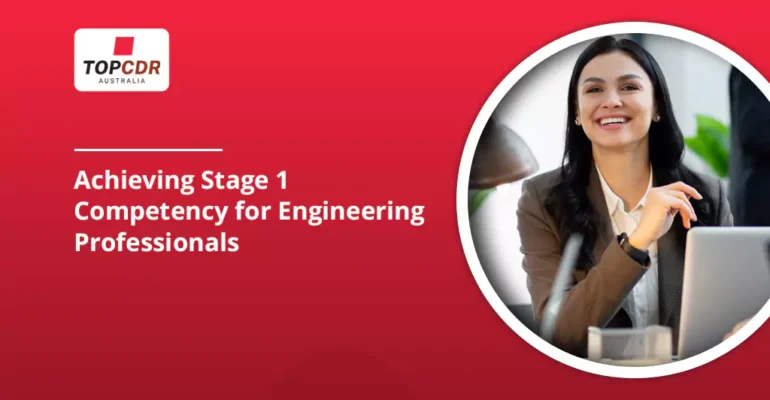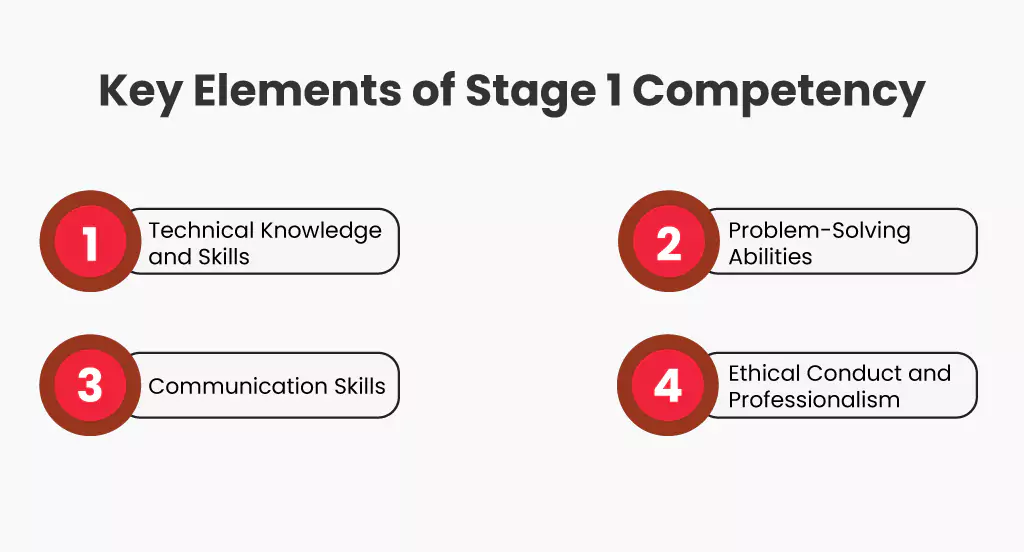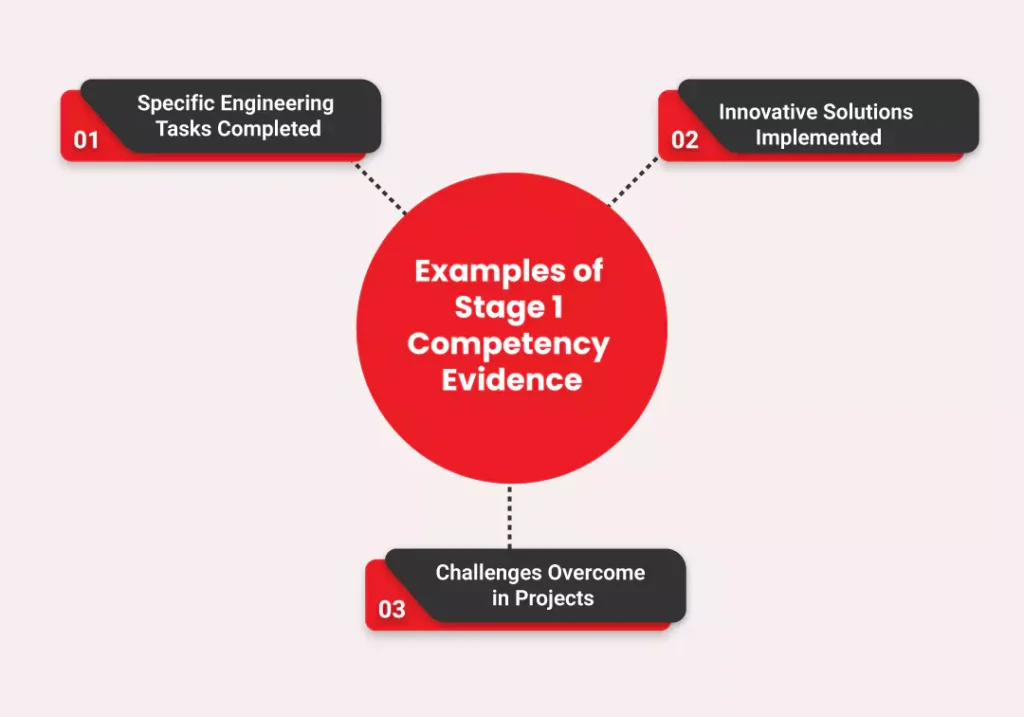Achieving Stage 1 Competency: Guide for Engineering Professionals

Achieving Stage 1 Competency: Guide for Engineering Professionals
Understanding Stage 1 Competency is crucial for engineers looking to migrate or gain recognition in Australia. This guide breaks down what Stage 1 Competency means, why it matters for the CDR process, and how it relates to the skills assessment required for migration. Engineers need to demonstrate specific skills and qualities during this assessment to ensure they meet Australian standards.
Stage 1 Competency refers to the essential skills and knowledge expected from engineers starting their careers. It’s about showing that you have the right technical skills, can solve problems effectively, communicate well, and behave ethically. Through your career episodes and evidence, you prove that you meet these standards, showing you’re ready for professional engineering roles and recognition.
1. Introduction to Stage 1 Competency
- Definition of Stage 1 Competency: This section provides a clear definition of Stage 1 Competency within the context of engineering assessment processes. It explains the fundamental skills, knowledge, and attributes expected of an engineer at the initial stage of their professional development.
- Importance in CDR Assessment Process: Here, you’ll discuss why Stage 1 Competency is crucial for a successful CDR assessment. It highlights how demonstrating Stage 1 Competency sets the foundation for assessing engineering capabilities and suitability for professional engineering roles.
- Overview of Competency Standards: This subheading offers an overview of the competency standards set by professional engineering bodies. It outlines the key criteria and expectations that engineers need to meet to achieve Stage 1 Competency.
2. Key Elements of Stage 1 Competency

- Technical Knowledge and Skills: Discusses the essential technical knowledge and skills required in the engineering discipline. This includes expertise in relevant engineering principles, tools, methodologies, and technologies.
- Problem-Solving Abilities: Describes the engineer’s capability to analyze complex problems, develop innovative solutions, and make informed decisions based on engineering principles and best practices.
- Communication Skills: Highlights the importance of effective communication in engineering, including the ability to convey technical information, collaborate with stakeholders, and present engineering concepts clearly.
- Ethical Conduct and Professionalism: Addresses the ethical responsibilities and professional conduct expected of engineers, such as adhering to codes of ethics, maintaining integrity, and prioritizing safety and sustainability.
3. Role of Stage 1 Competency in CDR Assessment
- Basis for Assessing Engineering Capabilities: Explains how Stage 1 Competency forms the basis for assessing an engineer’s capabilities and readiness for professional engineering roles. It outlines the core competencies evaluated during the CDR assessment process.
- Demonstrating Engineering Competence: Discusses how engineers demonstrate their competence through evidence of Stage 1 Competency in their CDR. This includes showcasing achievements, experiences, and projects that highlight technical proficiency and problem-solving skills.
- Evaluation Criteria for Stage 1: Outlines the specific evaluation criteria used to assess Stage 1 Competency in a CDR. This may include criteria related to technical competence, professional conduct, communication abilities, and adherence to engineering standards.
✅ Note: You can access some CDR samples for reference purposes on our website. 👈👈
4. Demonstrating Stage 1 Competency in Career Episodes
- Selecting Relevant Engineering Projects: Choose engineering projects from your career that best demonstrate your technical skills, problem-solving abilities, and professional achievements. Highlight projects that align with the competency standards of your engineering discipline.
- Describing Responsibilities and Tasks: Clearly outline your roles, responsibilities, and tasks undertaken in each selected project. Provide detailed descriptions of your contributions, emphasizing your direct involvement in engineering activities and decision-making processes.
- Showcasing Technical Skills and Achievements: Focus on showcasing specific technical skills and achievements relevant to Stage 1 Competency. Describe how you applied engineering principles, tools, and methodologies to solve complex problems and achieve project objectives.
5. Examples of Stage 1 Competency Evidence

- Specific Engineering Tasks Completed: Describe specific engineering tasks you performed, such as design, analysis, testing, or implementation. Explain the challenges faced and the solutions developed to overcome them.
- Innovative Solutions Implemented: Highlight any innovative solutions or approaches you developed to address engineering problems. Provide evidence of your creativity and ability to apply theoretical knowledge to practical situations.
- Challenges Overcome in Projects: Discuss challenges encountered during engineering projects and how you successfully resolved them. Demonstrate your problem-solving skills, adaptability, and resilience in handling complex technical issues.
6. Assessment Criteria for Stage 1 Competency
- Evaluation of Knowledge and Skills: The assessment of Stage 1 Competency focuses on evaluating your technical knowledge, engineering skills, and proficiency in applying engineering principles to real-world scenarios.
- Proficiency in Engineering Practices: Assessors look for evidence of your competence in performing engineering tasks, adhering to industry standards, and delivering high-quality engineering outcomes.
- Adherence to Professional Codes and Standards: Demonstrating ethical conduct, professionalism, and compliance with engineering codes of practice and standards is essential for Stage 1 Competency assessment.
Learn More: Guide to Writing an Effective ACS RPL Report. 🔥✅👈
7. Tips for Highlighting Stage 1 Competency in CDR
- Emphasizing Relevance to Engineering Discipline: Ensure that your career episodes and summary statement clearly demonstrate how your experiences align with the competency standards of your specific engineering discipline.
- Using Clear and Concise Language: Use clear and concise language to describe your engineering projects, responsibilities, and achievements. Avoid technical jargon or overly complex explanations.
- Providing Detailed and Specific Examples: Support your claims with detailed and specific examples of engineering tasks, challenges, and outcomes. Use quantifiable data, project metrics, and tangible results to substantiate your achievements.
✅ Also, Read: Step-by-Step Guide for CDR Engineers Australia. 🔔👈😊
Conclusion
Stage 1 Competency is foundational to the assessment process for engineering professionals and plays a critical role in the Competency Demonstration Report (CDR) required for skilled migration and engineering accreditation purposes. This section has provided a comprehensive overview of Stage 1 Competency, outlining its definition, importance in the CDR assessment process, and key elements evaluated by professional engineering bodies.
Demonstrating Stage 1 Competency in a CDR involves showcasing technical knowledge, problem-solving abilities, communication skills, and ethical conduct essential for professional engineering practice. Engineers must select relevant career episodes that align with competency standards, describe their roles and responsibilities, and highlight specific achievements that demonstrate technical proficiency and innovation.
In summary, Stage 1 Competency is a fundamental component of the CDR assessment process, reflecting an engineer’s capabilities and suitability for professional engineering practice. By effectively demonstrating Stage 1 Competency through compelling career episodes and evidence, engineers can enhance their prospects for migration and accreditation in the engineering profession.
FAQs
Q. What is Stage 1 Competency in engineering?
Stage 1 Competency refers to the fundamental skills, knowledge, and attributes expected of engineers at the initial stage of their professional development. It includes technical expertise, problem-solving abilities, communication skills, and ethical conduct.
Q. Why is Stage 1 Competency important for the CDR assessment process?
Stage 1 Competency sets the foundation for assessing an engineer’s capabilities and readiness for professional engineering roles. Demonstrating Stage 1 Competency through the CDR is essential for migration and engineering accreditation purposes in Australia.
Q. What are the key elements of Stage 1 Competency?
The key elements include technical knowledge and skills, problem-solving abilities, effective communication, and ethical conduct. These elements are evaluated to determine an engineer’s readiness for professional practice.
Q. How do engineers demonstrate Stage 1 Competency in a CDR?
Engineers demonstrate Stage 1 Competency through career episodes that showcase their achievements, experiences, and projects aligned with competency standards. They describe their roles, responsibilities, and contributions in detail.
Q. What criteria are used to evaluate Stage 1 Competency in a CDR?
Evaluation criteria include technical competence, problem-solving skills, communication abilities, adherence to professional codes, and proficiency in engineering practices. Assessors look for evidence of these criteria in the CDR.
Q. How should engineers select relevant engineering projects for demonstrating Stage 1 Competency?
Engineers should choose projects that best demonstrate their technical skills, problem-solving abilities, and achievements relevant to their engineering discipline. Projects should align with competency standards and showcase direct involvement and contributions.

 Chat with us
Chat with us